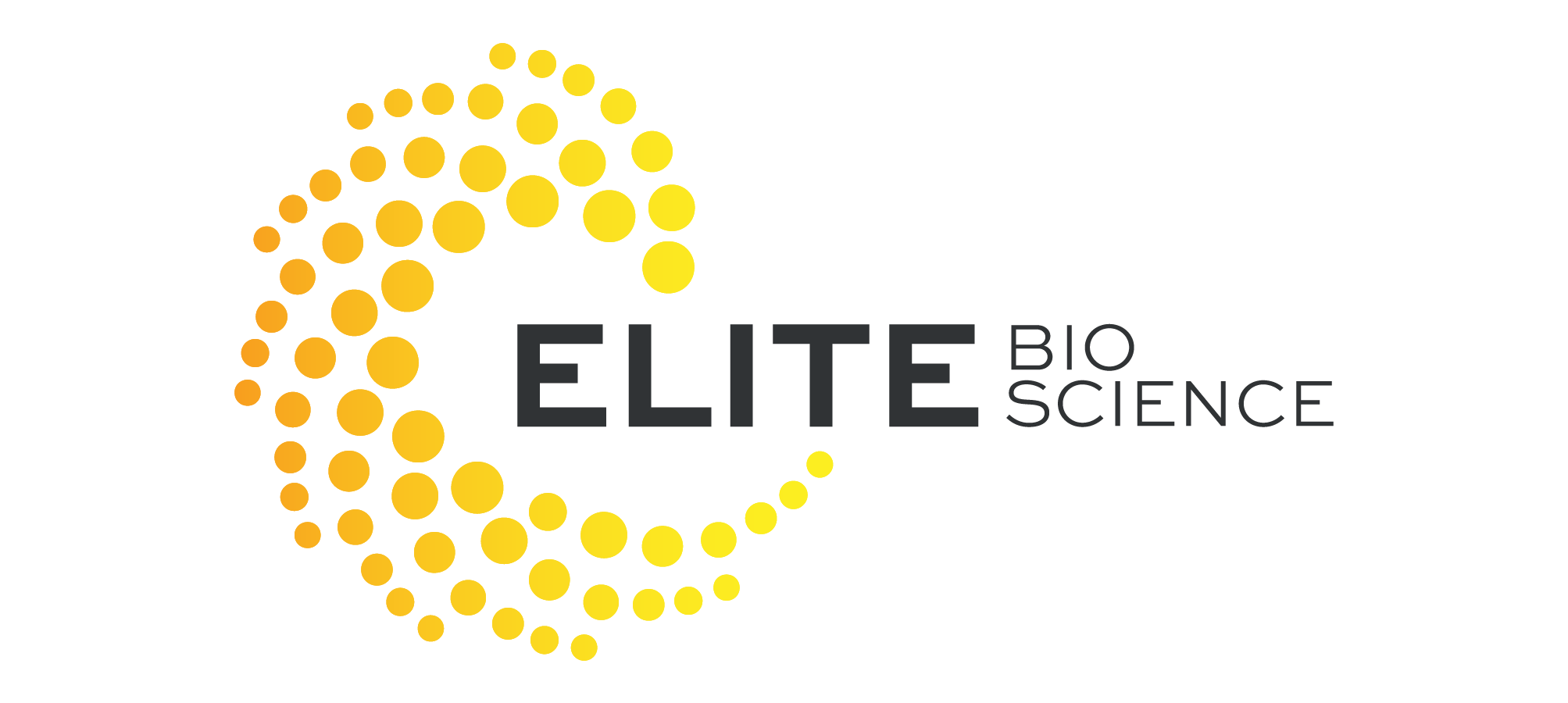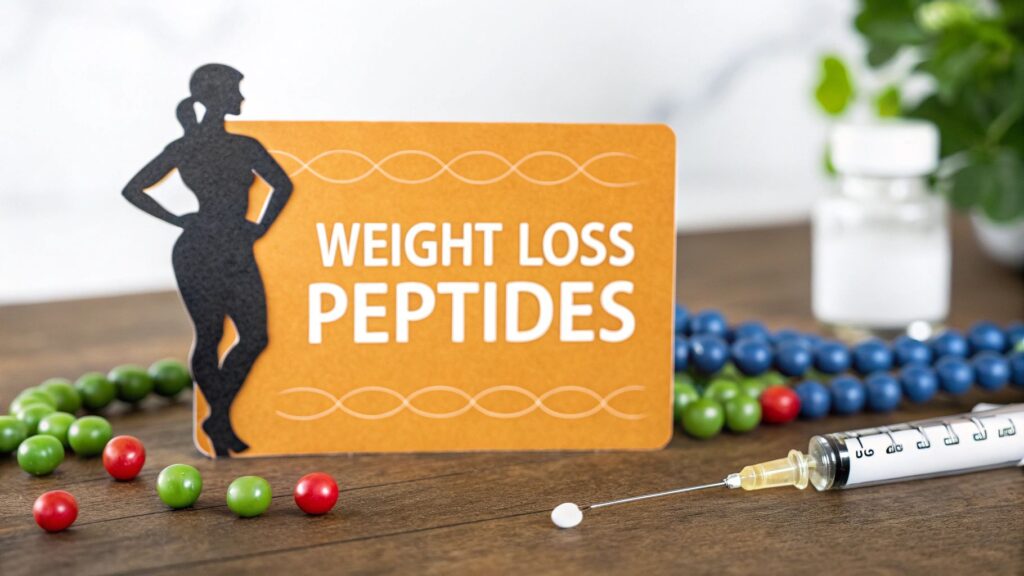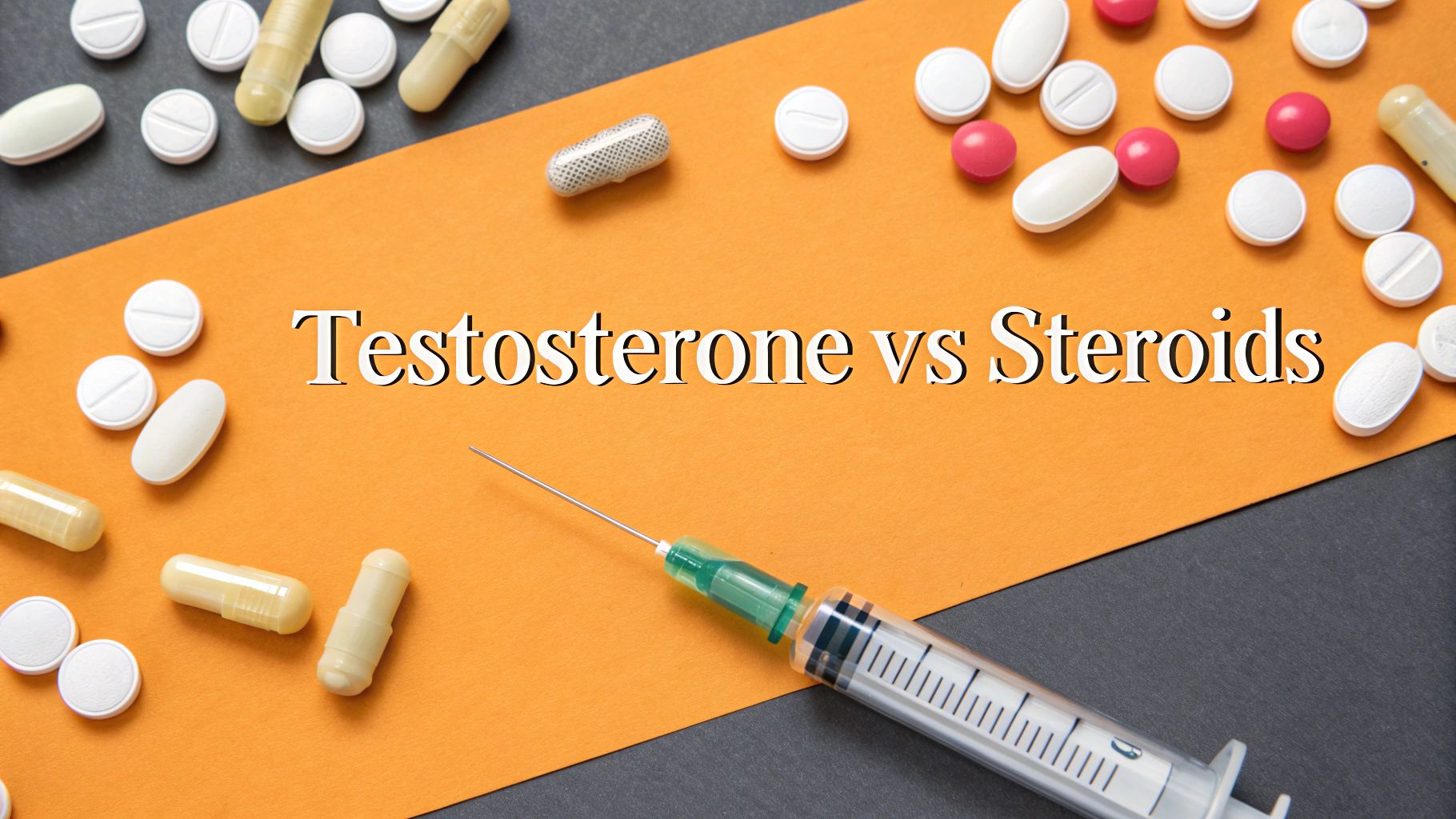Peptide therapy for weight loss is a medical treatment that uses specific chains of amino acids, called peptides, to help regulate your body’s own weight management systems. These treatments, which include well-known options like semaglutide and tirzepatide, act like tiny biological messengers. They communicate with your body to influence appetite, metabolism, and fat storage, often leading to significant, clinically-backed results.
What Is Peptide Therapy for Weight Loss
At its heart, peptide therapy uses these short amino acid chains to talk to your body at a cellular level. Think of peptides as tiny, highly specific keys designed to unlock certain functions. While proteins are large, complex structures, peptides are smaller and far more direct, allowing them to deliver very precise instructions.
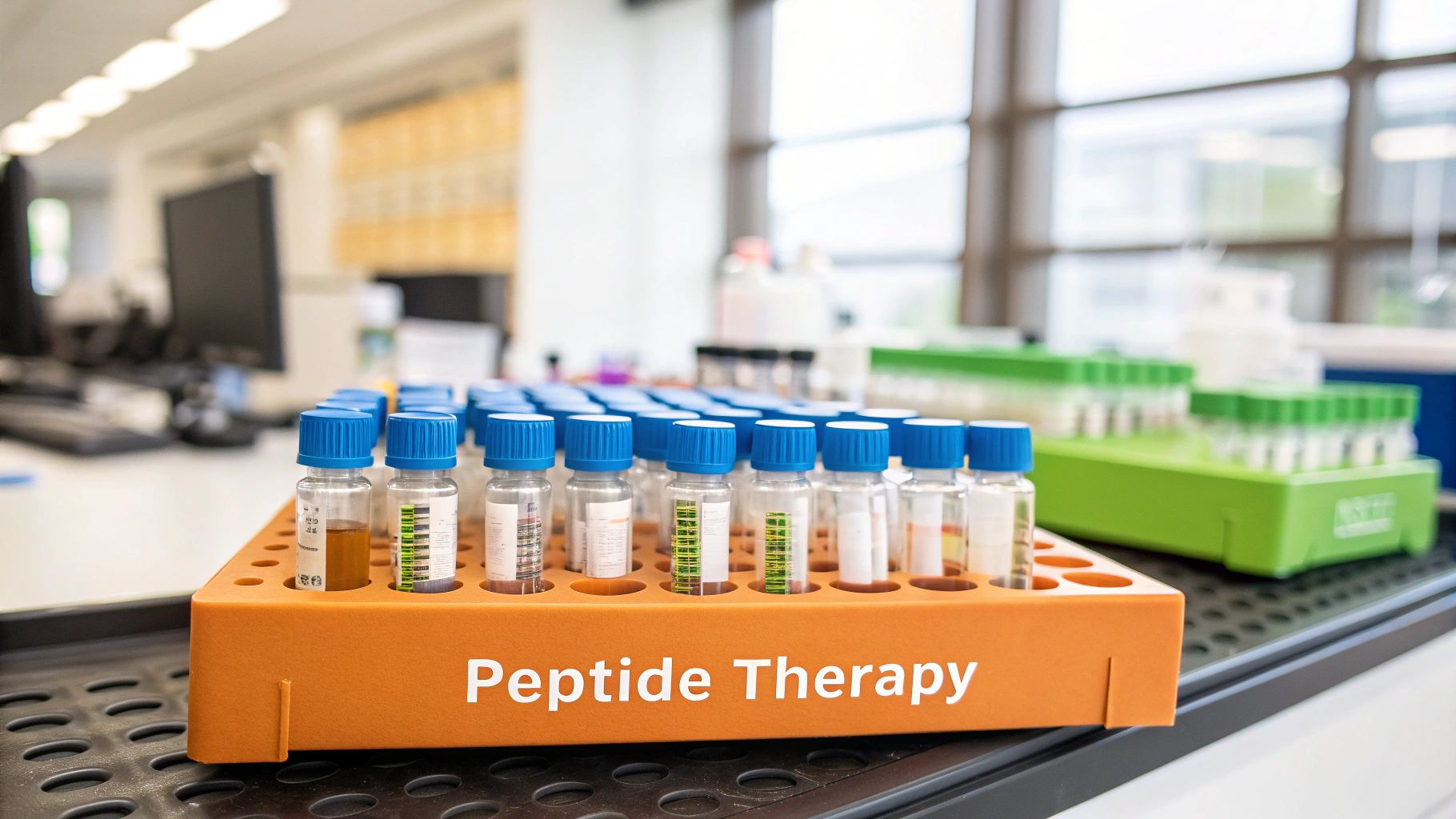
When it comes to weight management, these instructions can target the very systems that control hunger, how you metabolize fat, and even how your body handles sugar. This isn’t a fad diet or some generic supplement from a health food store; it’s a medically supervised approach designed to work in harmony with your natural biology.
To make these ideas a bit clearer, here’s a quick summary of the core concepts.
Core Concepts of Peptide Therapy for Weight Loss
This table breaks down the fundamental ideas behind peptide therapy, giving you a quick reference for the key terms and concepts we’ll be discussing.
| Concept | Simple Explanation |
|---|---|
| Peptides | Short chains of amino acids that act as signal messengers in the body. |
| Biological Messengers | Like tiny keys that deliver specific instructions to cells to trigger a response. |
| Hormonal Regulation | The process of balancing hormones that control hunger, fullness, and metabolism. |
| Targeted Action | Peptides affect specific cell receptors, avoiding widespread, unintended side effects. |
| Metabolic Support | Helping the body become more efficient at burning fat and using energy. |
Understanding these basics is the first step to seeing how this therapy provides a more sophisticated way to manage weight.
A Modern Approach to Weight Management
The rise of peptide therapy for weight loss represents a major shift in how we look at such a complex health issue. Instead of focusing only on the old “calories in, calories out” model, this therapy gets to the root of the problem by addressing the underlying hormonal and metabolic signals that can make losing weight feel like a constant uphill battle.
These treatments have gained significant traction worldwide, especially in the US and Europe. Current data shows that about 12% of adults have tried GLP-1 receptor agonists—a popular class of peptides—specifically for weight loss. This rapid adoption, which you can read more about on Innerbody.com, is driven by both strong clinical results and the life-changing experiences patients are reporting.
The real goal of peptide therapy isn’t just to silence symptoms like hunger. It’s about re-regulating the body’s internal systems and restoring balance to the complex web of hormones that dictate our appetite and how we use energy.
Peptides Versus Traditional Methods
Unlike many traditional diet pills that rely on stimulants or unproven herbal ingredients, the peptides used for weight loss are often bioidentical or designed to closely mimic substances your body already makes. This allows for a much more targeted action with a lower risk of broad, unintended side effects.
For example, certain peptides can help you feel fuller much faster and for a longer period, quieting the constant “food noise” that so often derails dieting efforts. Others can improve your body’s sensitivity to insulin, a crucial factor for managing blood sugar and preventing your body from storing excess fat.
This approach offers a few key advantages:
- Targeted Action: Peptides are built to interact with specific cellular receptors, leading to precise physiological responses without disrupting the whole system.
- Hormonal Regulation: They directly help manage key hormones like ghrelin (the “hunger hormone”) and GLP-1, which signals satiety and tells your brain you’re full.
- Metabolic Support: Certain peptides can nudge your body to burn more fat for energy while helping to preserve lean muscle mass, which is often lost during dieting.
Ultimately, understanding peptide therapy for weight loss means seeing it for what it is: a powerful tool to be used within a comprehensive health plan. It’s a science-backed method designed to work with your body, not against it, providing the support needed to achieve sustainable and meaningful results under the guidance of a qualified medical professional.
How Peptides Influence Your Body’s Weight Systems
To really get how peptide therapy for weight loss works, it helps to think of your body’s weight regulation system as a high-tech communication network. This isn’t a single switch you can flip; it’s a constant conversation happening between your gut, your brain, and even your fat cells. Peptides are the expert messengers in this network, delivering precise signals that can fundamentally change how your body handles hunger and uses energy.
Most of the peptides making waves in weight loss, like semaglutide, are what we call GLP-1 receptor agonists. GLP-1 (glucagon-like peptide-1) is a hormone your gut naturally releases after a meal. Its main job is to send a clear message to your brain: “Hey, we’re full down here.” This is what triggers that feeling of satiety and quiets the urge to keep eating.
The catch is, your body’s natural GLP-1 is incredibly short-lived, breaking down in just a few minutes. The therapeutic peptides used for weight loss are designed to mimic this natural hormone, but with a crucial engineering tweak that lets them stick around for hours or even days. This extended broadcast is what makes them so powerful for managing weight.
The Brain and Appetite Control
The primary target for these peptides is the appetite control center in your brain, a region called the hypothalamus. When a therapeutic peptide activates the GLP-1 receptors here, it’s like turning up the volume on those “I’m full” signals.
This has two game-changing effects:
- Reduced Hunger: You just don’t feel as hungry throughout the day. This makes it far easier to eat fewer calories without that constant, nagging feeling of deprivation.
- Increased Satiety: When you do eat, you feel satisfied much more quickly and for a lot longer. This helps you naturally manage your portion sizes without having to think about it.
This one-two punch is fantastic for quieting what many people call “food noise”—those persistent, intrusive thoughts about food and cravings that make losing weight feel like a constant battle. Patients often describe a profound sense of relief as this mental chatter fades, freeing them up to make more mindful food choices. For a closer look at this mechanism, you can explore our guide on understanding appetite regulation and how peptides can help control cravings.
Slowing Down the Stomach
Another key part of the puzzle is how these peptides affect gastric emptying, which is just the technical term for how fast food moves out of your stomach. GLP-1 agonists slow this process down quite a bit.
Imagine your stomach is a sink. Under normal conditions, food drains out at a pretty steady rate. Peptide therapy is like partially closing that drain, making the sink empty much more slowly. This means food physically stays in your stomach for longer.
This “slow-drain” effect is a huge contributor to feeling full for hours. Because your stomach is still busy processing its contents, it keeps sending signals to your brain that you don’t need more food yet. This effectively stretches the time between meals and naturally cuts down your overall calorie intake.
This is also why some people feel a little nauseous when they first start treatment; the body simply needs some time to get used to this new, slower digestive rhythm.
Improving Blood Sugar and Insulin Response
Beyond appetite and digestion, these peptides are superstars for your metabolic health. They significantly improve how your body handles blood sugar, which is a cornerstone of any effective weight management plan.
When you eat, your body releases insulin to shuttle sugar (glucose) from your blood into your cells to be used for energy. Many people who are overweight also have insulin resistance, meaning their cells don’t respond well to insulin’s knock at the door. This leads to high blood sugar and signals the body to store more fat.
GLP-1 agonists help fix this dysfunctional system by:
- Prompting insulin release only when blood sugar levels are actually high.
- Suppressing glucagon, a hormone that tells your liver to dump stored sugar into the bloodstream.
This improved blood sugar control prevents the sharp spikes and brutal crashes that so often trigger cravings for sugary, high-carb foods. By keeping your energy levels stable, peptides create a metabolic environment that’s primed for burning fat instead of storing it. It’s this powerful combination—appetite suppression, slower digestion, and better metabolic function—that creates a multi-pronged attack for achieving and sustaining real weight loss.
Exploring the Leading Peptides for Weight Management
When we talk about “peptide therapy,” it’s not a one-size-fits-all treatment. Instead, think of it as an umbrella term for a whole family of specific messenger molecules, each with a unique job to do. It’s a common misconception that all weight loss peptides work the same way, but understanding the key players is what makes this field so powerful.
It’s a bit like having a specialized toolkit for your body. You wouldn’t use a hammer to turn a screw; likewise, different peptides are designed for very different biological tasks. Some are masters of appetite control, sending strong “I’m full” signals to your brain. Others focus on fine-tuning your metabolism and improving your body composition.
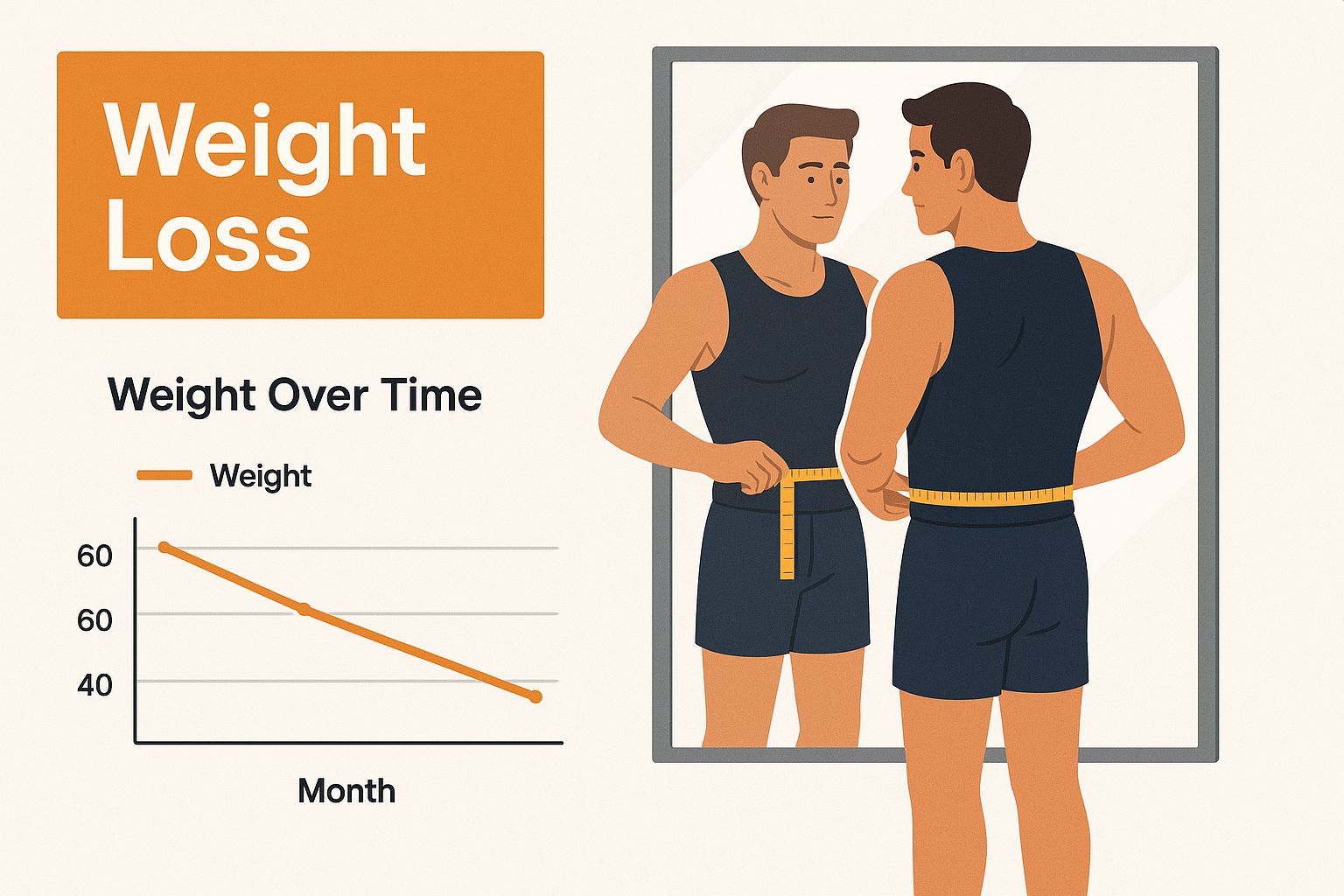
This image perfectly captures the goal for so many people exploring peptide therapy: achieving real, measurable changes in their physique and health.
To help you understand the options, let’s take a closer look at some of the most prominent peptides used for weight management today.
The Power of GLP-1 and GIP Agonists
This category has completely changed the game in medical weight loss. These peptides work by mimicking natural gut hormones that regulate appetite and blood sugar, making them incredibly effective.
Semaglutide: The Appetite Suppressor
When people mention peptide therapy for weight loss, they are very often talking about GLP-1 receptor agonists like Semaglutide. This is the powerhouse active ingredient in well-known medications. Its primary job is to act like the hormone GLP-1, sending powerful satiety signals directly to your brain.
By activating these receptors, Semaglutide does two main things:
- It significantly quiets your appetite, making it far easier to eat fewer calories without that constant feeling of deprivation.
- It slows down how quickly your stomach empties, which keeps you feeling full for much longer after a meal.
The result for many is a dramatic reduction in “food noise”—that constant, distracting chatter about food—and a newfound ability to control portions. It directly tackles the hunger and cravings that so often derail even the most determined weight loss efforts.
Tirzepatide: The Dual-Action Powerhouse
A newer and exceptionally effective player is Tirzepatide, the active compound in Mounjaro and Zepbound. What makes Tirzepatide so unique is its dual-action approach. It doesn’t just activate the GLP-1 receptor; it also targets another crucial hormone receptor called GIP (glucose-dependent insulinotropic polypeptide).
This “double impact” is what really sets it apart. While GLP-1 is fantastic for crushing appetite, adding GIP activation seems to amplify its effects on blood sugar control and leads to even more significant weight loss. It’s like having two different managers working together in perfect harmony to regulate your metabolism and appetite.
This synergistic effect is precisely why Tirzepatide has shown such remarkable results in clinical trials. By engaging both pathways, it mounts a more comprehensive attack on the metabolic issues that drive weight gain.
Growth Hormone Peptides for Body Composition
Not all weight loss peptides are focused on appetite. Another class of peptides works by encouraging your body to produce more of its own human growth hormone (HGH). Two of the most popular in this category are CJC-1295 and Ipamorelin, which are almost always used together for a powerful synergistic effect.
These peptides, known as growth hormone secretagogues, don’t just dump HGH into your system. Instead, they gently prompt your pituitary gland to release its own growth hormone in a natural, rhythmic pulse. This makes it a much more subtle and bio-identical approach.
The main benefits for weight management are all about optimizing your body’s composition:
- Increased Lipolysis: Encourages the breakdown of stored body fat to be used for energy.
- Lean Muscle Preservation: Helps you build and hold onto lean muscle, which is vital for a healthy metabolism, especially when you’re in a calorie deficit.
- Improved Recovery: Aids in tissue repair and can reduce inflammation, which is a huge plus for staying active and consistent with exercise.
This strategy is less about dramatic appetite suppression and more about sculpting your physique. By helping you burn fat while keeping your muscle, these peptides support a stronger, more athletic build and a higher resting metabolic rate.
Comparing Popular Peptides Used for Weight Loss
To make it easier to see how these different options stack up, the table below breaks down their primary functions and benefits.
| Peptide Name | Primary Mechanism | Key Benefits |
|---|---|---|
| Semaglutide | GLP-1 Receptor Agonist | Potent appetite suppression, slows stomach emptying, reduces “food noise.” |
| Tirzepatide | Dual GLP-1/GIP Receptor Agonist | Superior appetite suppression, enhanced blood sugar control, often greater weight loss. |
| CJC-1295 / Ipamorelin | Growth Hormone Secretagogue | Promotes fat burning (lipolysis), preserves and builds lean muscle, improves recovery. |
As you can see, the world of peptides offers a variety of sophisticated tools for weight management. Whether the goal is to conquer cravings or to build a leaner, more metabolic body, there is a peptide strategy that can help.
For a deeper dive into all the options available, you can explore our comprehensive guide on peptides for weight loss. Each of these compounds offers a different path forward, allowing for personalized treatments that align with your specific health goals.
The Payoffs and The Precautions: Benefits vs. Side Effects
Taking the leap with peptide therapy for weight loss is a powerful way to reclaim your health, but it’s smart to go in with a clear-eyed view of both the rewards and the realities. The main draw, of course, is the promise of significant, clinically-backed weight loss—the kind that often feels out of reach with diet and exercise alone.
This isn’t about that demoralizing cycle of losing a few pounds only to see them come right back. Peptide therapy works at a biological level, getting to the root of the problem by recalibrating the hormonal signals that control your hunger and fat storage. The results can be truly substantial, with many patients dropping a serious percentage of their body weight and finally finding a real path forward after years of struggle.
But the good news doesn’t stop at the number on the scale. The weight loss achieved with peptides often kicks off a cascade of other health improvements that boost your overall well-being and long-term vitality.
The Health Benefits Beyond Weight Loss
Losing weight is a fantastic starting point, but it’s just one piece of a much bigger puzzle. Peptide therapy can create a positive ripple effect through your entire body, leading to concrete, measurable upgrades in your metabolic health.
One of the biggest wins is improved blood sugar control. Peptides like the GLP-1 agonists help your body use insulin far more efficiently, which is critical for smoothing out the energy spikes and crashes that drive cravings. This alone can dramatically lower your risk of developing type 2 diabetes.
On top of that, carrying excess weight puts a huge strain on your heart. As the pounds come off with peptide therapy, many people see incredible improvements in their cardiovascular risk factors.
- Healthier Blood Pressure: Less body weight means less work for your heart, often leading to a natural drop in blood pressure.
- Better Cholesterol Levels: Therapy can help bring down “bad” LDL cholesterol and triglycerides while giving “good” HDL cholesterol a potential boost.
- Reduced Inflammation: Chronic, low-grade inflammation is a silent driver of countless diseases. Peptides can help calm this inflammatory state, adding another layer of protection for your cardiovascular system.
By tackling weight, blood sugar, and cardiovascular health all at once, peptide therapy provides a comprehensive strategy for improving your long-term health, not just changing your reflection in the mirror.
A Realistic Look at Potential Side Effects
While the benefits are compelling, it’s just as important to be honest about the potential side effects. Transparency is key to making a smart, informed decision. The most common side effects are gastrointestinal, and they’re a direct result of one of the therapy’s core mechanisms: slowing down how quickly your stomach empties.
Because these peptides keep food in your stomach longer (which helps you feel full), your body might need a little time to get used to the new pace. This adjustment period can lead to temporary issues like:
- Nausea
- Diarrhea or constipation
- Bloating or feeling overly full
For most people, these side effects are mild to moderate and fade away as their body adapts over the first few weeks. The standard protocol—starting with a low dose and slowly increasing it under medical supervision—is specifically designed to make this adjustment period as smooth as possible.
Serious Risks and the Need for Medical Oversight
Although rare, there are more serious risks tied to peptide therapy that highlight exactly why it must always be managed by a qualified medical professional. Complications like pancreatitis (an inflammation of the pancreas) have been reported in a very small number of cases.
This is precisely why a thorough medical screening is non-negotiable. A doctor will dig into your personal and family medical history to look for any red flags, like a history of medullary thyroid carcinoma or Multiple Endocrine Neoplasia syndrome type 2 (MEN 2), which would make this therapy unsafe for you.
Ongoing monitoring is your safety net. It allows your provider to track your progress, help manage any side effects, and ensure the treatment is working safely and effectively. If you have more questions, our guide on whether peptide therapy is safe offers a deeper dive. This partnership with a professional is your most important tool for a successful and secure experience.
Why Diet and Lifestyle Are Critical for Success

It’s easy to think of peptide therapy as a magic bullet for weight loss—a simple fix that does all the work on its own. While these treatments are incredibly effective, that idea is a complete myth. The reality is that peptides aren’t a substitute for a healthy lifestyle; they’re a powerful tool designed to make that lifestyle more effective and sustainable.
Think of it this way: peptide therapy hands you the keys to a high-performance engine. But for that engine to perform at its peak and last for years, it still needs premium fuel (good nutrition) and regular maintenance (exercise). Without those fundamentals, even the most advanced engine will eventually sputter and fail.
This is especially true when it comes to keeping the weight off for good. Peptides give you a powerful biological advantage by quieting hunger and boosting your metabolism, but it’s your daily choices that lock in those gains for the long haul.
The Challenge of Preserving Lean Muscle
One of the biggest hurdles during any period of rapid weight loss is holding onto lean muscle mass. When you lose weight quickly, your body doesn’t just burn fat; it often sacrifices metabolically active muscle tissue right along with it. This is a major pitfall that can sabotage your long-term success.
Why is muscle so important? Muscle is your body’s metabolic furnace. It burns more calories at rest than fat does, so losing it lowers your resting metabolic rate. That means your body needs fewer calories just to function, making it harder to keep losing weight and much, much easier to regain it later.
Preserving muscle isn’t just about looking toned. It’s about protecting your metabolism. Keeping your muscle mass high ensures your body remains an efficient calorie-burning machine, setting you up for sustainable weight maintenance long after the therapy ends.
Fueling Your Body the Right Way
This is where strategic nutrition becomes non-negotiable. While peptides help manage your appetite, what you choose to eat with that reduced hunger is what protects your muscle. The single most important nutrient in this equation is protein.
Research shows that while peptide injections can lead to significant weight loss—around 14.9% of body weight—this rapid drop can be accompanied by a loss of 20–50% of lean muscle mass. To fight this, experts recommend increasing your protein intake to between 1.2–2.0 grams per kilogram of body weight per day. You can find more details on these findings and how to protect your health during therapy by exploring this guide to peptide therapy for 2025.
The Power of Resistance Training
Alongside a protein-rich diet, resistance training is your absolute best friend for preserving muscle. Activities like lifting weights, using resistance bands, or doing bodyweight exercises send a clear signal to your body: “We need this muscle, don’t burn it for fuel!”
Here’s how to build a fitness routine that supports your goals:
- Focus on Compound Movements: Exercises like squats, deadlifts, and push-ups work multiple muscle groups at once, giving you the most metabolic bang for your buck.
- Aim for Consistency: Try to get in 2-3 resistance training sessions per week. Consistency is far more important than intensity, especially when you’re starting out.
- Listen to Your Body: Peptide therapy can sometimes affect your energy levels. It’s okay to adjust your workouts as needed and make recovery a priority.
Ultimately, peptide therapy for weight loss provides the biological tailwind you need to succeed. But it’s the one-two punch of smart nutrition and consistent exercise that lets you harness that wind and sail toward lasting, life-changing results.
Of course. Here is the rewritten section, designed to sound like an experienced human expert and match the provided examples.
Your Questions About Peptide Therapy, Answered
Deciding to explore medical weight loss is a big step, and it’s completely normal to have a ton of questions. When it comes to something like peptide therapy for weight loss, you want clear, straightforward answers you can trust. I’ve put together this section to tackle the most practical concerns I hear from patients, from who actually qualifies for treatment to what happens if you ever stop.
The goal here is to cut through the noise and give you the confidence that comes with real clarity. By getting these key questions out of the way, you’ll be much better prepared to have a meaningful conversation with a healthcare professional. Let’s get into the details that truly matter.
Who Is a Good Candidate for Peptide Therapy?
First things first: this isn’t a treatment for cosmetic goals or losing a few vanity pounds. Peptide therapy is a serious medical tool intended for individuals with a genuine clinical need for weight loss. The ideal candidate is typically an adult with a body mass index (BMI) of 30 or higher, which is the clinical threshold for obesity.
Alternatively, someone with a BMI of 27 or higher who is also dealing with a weight-related health problem may be a good fit. We’re talking about serious conditions like type 2 diabetes, high blood pressure, or high cholesterol, where losing weight is a critical part of managing their overall health.
A full medical evaluation is absolutely essential to screen for any reasons why this therapy might not be safe for you.
A critical part of this screening is checking your medical history. For instance, anyone with a personal or family history of medullary thyroid carcinoma or a rare genetic condition called Multiple Endocrine Neoplasia syndrome type 2 (MEN 2) would not be a candidate. Certain peptides carry specific risks for these conditions, and safety always comes first.
What Happens When You Stop Taking Weight Loss Peptides?
This is probably one of the most important questions you can ask, because it gets right to the heart of long-term success. Once you stop taking a GLP-1 agonist like semaglutide or tirzepatide, the biological effects that suppress your appetite and regulate your metabolism will fade away. The “slow drain” effect that keeps food in your stomach longer will return to normal, and the powerful “I’m full” signals to your brain will quiet down.
Because of this, many people do regain weight. Obesity is a chronic, relapsing condition, not a temporary problem you can cure and forget about. Think of these peptides as a long-term management tool, not a one-and-done fix. In fact, studies have shown that a large portion of the weight lost is often regained within a year of stopping the medication if new, sustainable habits haven’t been locked in.
This really drives home the importance of building a solid lifestyle plan before you even start therapy. A true commitment to the diet and exercise strategies you learn during treatment is your single best defense against regaining the weight.
How Do You Find a Safe and Reputable Provider?
Choosing the right provider is the most critical decision you’ll make on this journey. The explosion in popularity of these treatments has, unfortunately, led to a surge of sketchy online services. Your absolute top priority should be finding a licensed medical professional who has real experience in weight management or endocrinology.
Here’s what to look for in a provider you can trust:
- A Licensed Medical Professional: This means a doctor (MD/DO), nurse practitioner (NP), or physician assistant (PA) who is legally allowed to prescribe medication in your state.
- A Thorough Medical Screening: A legitimate provider will insist on a full health assessment. This includes reviewing your medical history, discussing your goals, and almost certainly ordering lab work.
- A Live Consultation: Be extremely wary of any service that will give you a prescription after you fill out a simple online form. A real-time video consultation is the bare minimum for establishing a proper doctor-patient relationship.
- FDA-Approved Medication: Your provider must source their medication from a legitimate, licensed pharmacy. They should be completely transparent about where your peptides are coming from.
- Ongoing Support and Monitoring: A good clinic doesn’t just hand you a prescription and vanish. They offer continuous support, help you manage any side effects, and monitor your progress to make adjustments as needed.
Are There Medications to Avoid During Peptide Therapy?
Yes, and this is a vital safety issue. It is absolutely critical that you give your doctor a complete list of every single medication, supplement, and over-the-counter drug you take. Because peptides like semaglutide work by slowing down how quickly your stomach empties, they can dramatically change how your body absorbs oral medications.
This delay can make other drugs less effective or alter how long they take to work, which is especially dangerous for medications that require very precise and consistent dosing.
For example, this interaction is a major concern for:
- Insulin or sulfonylureas used for diabetes
- Oral thyroid medications
- Certain blood thinners
Your doctor needs to review your entire medication list to safely manage these potential interactions. It’s also important to know that these peptides are not recommended for anyone who is pregnant, breastfeeding, or actively trying to conceive. Your health and safety must always be the top priority.
Ready to explore how peptide therapy can support your health and weight management goals? The team at Elite Bioscience is here to help. We offer medically supervised peptide programs, all prescribed by licensed professionals and delivered with the highest standards of safety and care. Start your journey by visiting us at https://elitebioscience.co to learn more.
